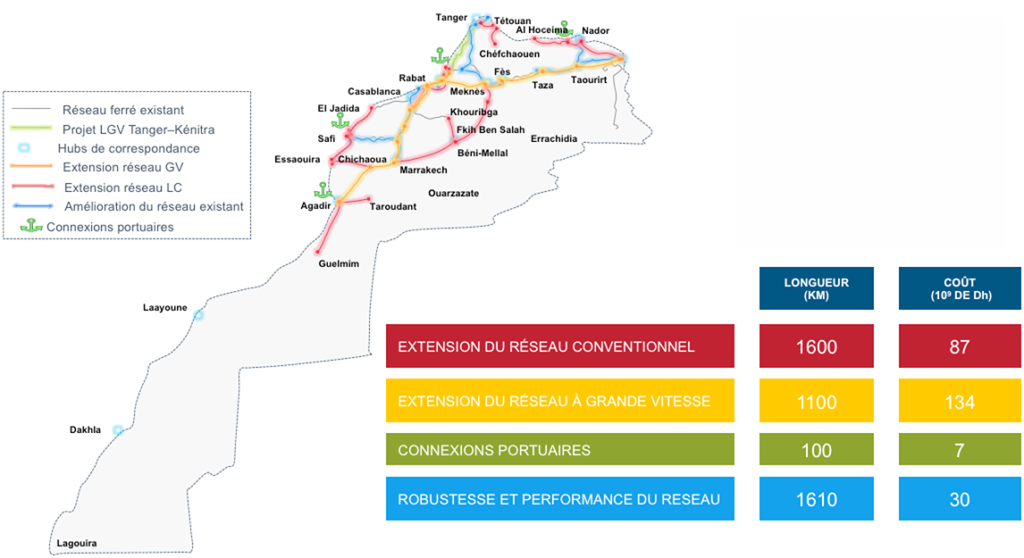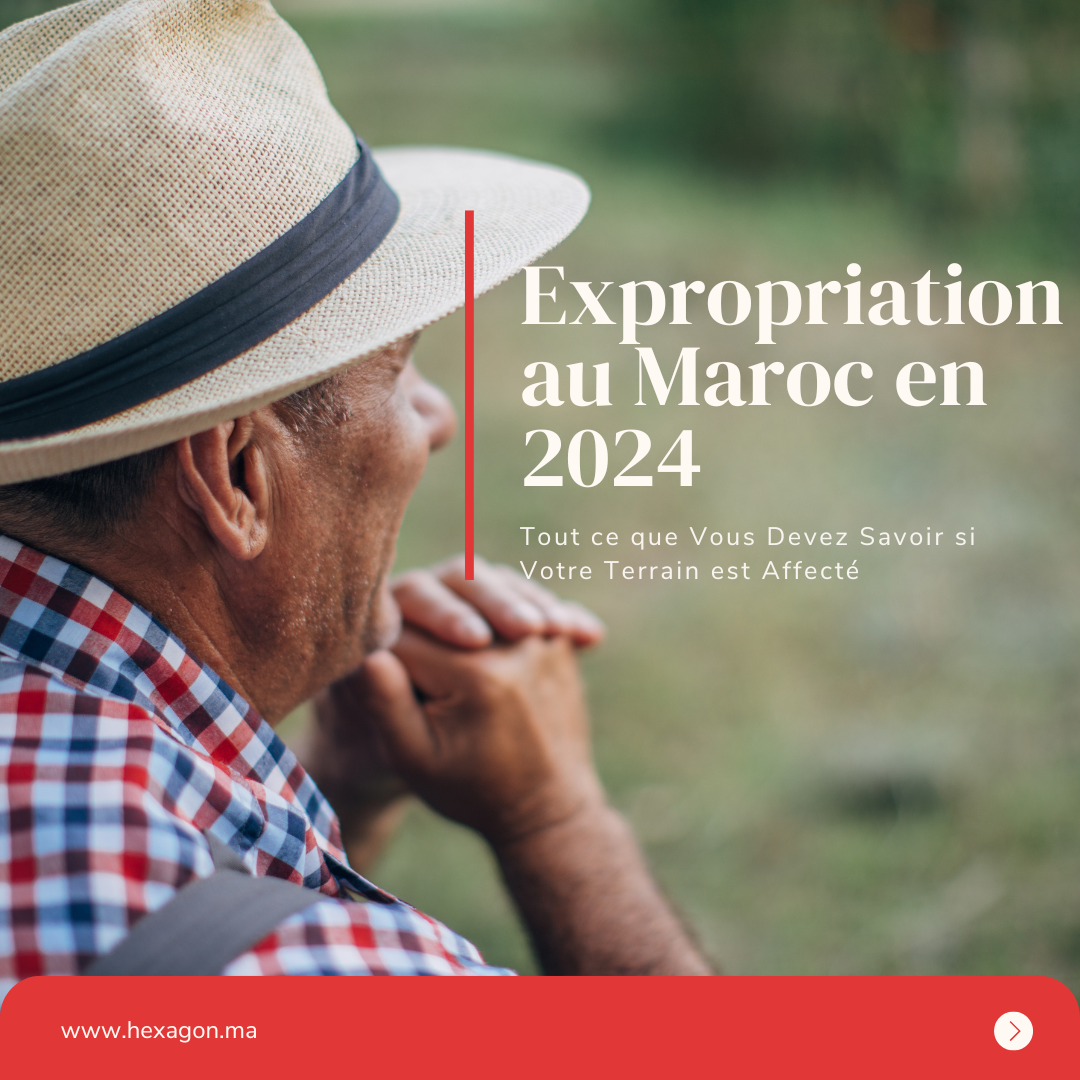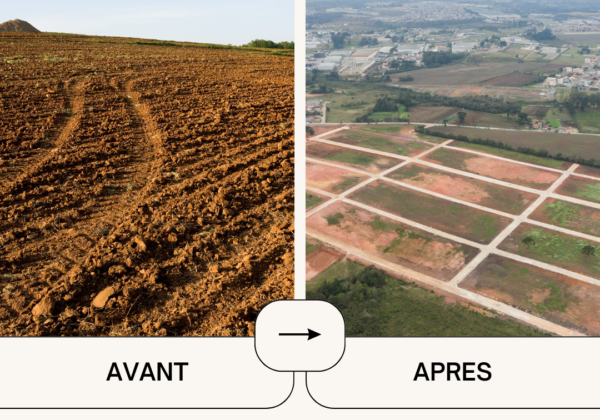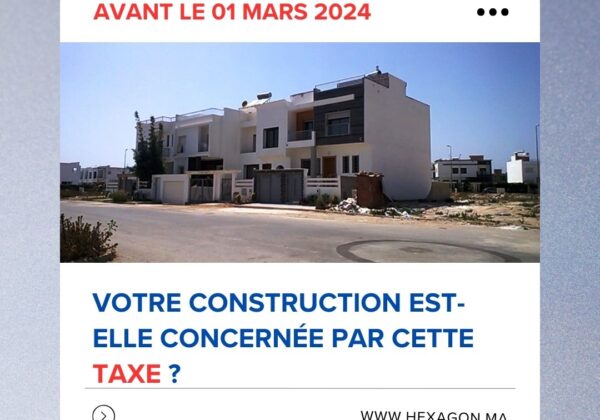Expropriation in Morocco in 2024: the kingdom stands at a historic turning point with the ambitious launch of mega-projects that promise to transform the urban and rural landscape. From high-speed rail lines to ultramodern stadiums, dams, expansive freeways and desalination plants, Morocco is embarking on an unprecedented era of modernization. But what exactly does this wave of development mean for the landowners whose property lies in the path of these advances? How is the expropriation process orchestrated to serve both the public interest and respect individual rights?
As the country navigates through these transformations, many questions are emerging about the legal procedure for expropriation in the public interest. Who is eligible for compensation? What rights do affected owners have, and how can they ensure fair compensation? This article aims to shed light on these questions by detailing the legal mechanisms in place, from the first stages of expropriation to the various compensation and appeal procedures, all within the specific framework of the 2024 flagship projects. Join us in this essential guide to understanding your rights and responsibilities as a landowner in Morocco in this year of infrastructure revolution.

What is Expropriation for Public Purposes?
Expropriation for public use in Morocco is a process legally governed by law n°7-81 on expropriation, which enables the State, local authorities and other designated entities to requisition real estate for projects deemed to be in the public interest. Under Moroccan law, expropriation can only take place if the public utility of the project has been officially recognized, and if the procedure follows the stages defined by the legislation in force.
Outline of the procedure
- Declaration of Public Utility: The first step is to officially declare the public utility of the project, specifying the area and properties likely to be expropriated. This declaration is made by an administrative act and is essential for the rest of the process.
- Publicity and information: The declaration must be widely publicized, notably by publication in the Official Bulletin and by posting in the areas concerned. This step is designed to inform owners and the public, guaranteeing the transparency of the process.
- Administrative inquiry and "Acte de Cessibilité": Before any expropriation, an administrative inquiry is carried out to specify the properties to be expropriated. The "acte de cessibilité", which results from this inquiry, formally designates the land and buildings concerned. Owners and other holders of real rights over the properties are given the opportunity to submit their observations.
- Compensation: One of the crucial phases is the determination of the expropriation indemnity, which must be fair and prior to any actual expropriation. This compensation is determined in accordance with legal provisions, with the aim of fairly compensating the owners affected.
NB: Exceptions and special features
It is important to note certain exceptions where certain properties, such as religious buildings, cemeteries and public buildings, cannot be expropriated. In addition, projects concerning national defense may follow a simplified procedure.

Taking possession and compensation in the context of expropriation in Morocco
Step 1: Taking possession procedure
The taking of possession of an expropriated property begins once all the formalities relating to the deed of transferability have been completed, or immediately after notification of this deed. The expropriator must then file a petition with the competent administrative court to order provisional possession of the property, subject to prior deposit or payment of the proposed compensation.
Stage 2: Declaration of expropriation and determination of compensation
Simultaneously with the request to take possession, the expropriator submits another request to obtain the official transfer of ownership and the setting of expropriation compensation. This essential judicial step ensures that the expropriation is carried out with full respect for the rights of the affected owners.
Step 3: Jurisdiction of the Juge des Référés
The juge des référés has exclusive jurisdiction to authorize the prior taking of possession, on the basis of a provisional indemnity. This compensation is calculated on the basis of the expropriator's preliminary offers, thus guaranteeing fair initial compensation for the owner.
Step 4: Setting the Expropriation Compensation
Final compensation for expropriation is set according to strict criteria designed to compensate only the direct and certain loss caused by the expropriation. It is based on the value of the property at the time of expropriation, without taking into account speculative increases in value or improvements subsequent to the declaration of public interest.
Owner's rights and remedies
Owners have the possibility of requesting a review of the compensation if the remaining part of their property is rendered unusable, or if partial expropriation results in a devaluation of their property. This mechanism is designed to ensure full and fair compensation.
Notification and publicity of decisions
Judicial rulings on expropriation are notified to the parties concerned, and are adequately publicized to ensure the transparency of the process. This includes publication in legal newspapers and posting in municipal offices.
Effective Possession
The expropriator can only take possession after notification or publication of the judicial decisions and payment or deposit of the provisional indemnity, thus ensuring that the rights of the owners are respected right up to the final stage of the process.

Payments, deposits and recourse
Payment and Deposit of Indemnities
Once the compensation has been fixed by judgment, the expropriator must pay or deposit it without delay. If the rightful claimants have not come forward, or if the title deeds are insufficient or disputed, the compensation is deposited with the Caisse de dépôt et de gestion. This temporary measure protects the interests of property owners while allowing public utility projects to continue.
Interest on arrears
In the event of late payment or deconsignment of sums due, interest at the legal rate is automatically applied, guaranteeing additional compensation to rightful claimants for the financial loss suffered.
Avenues of appeal
Moroccan legislation clearly sets out the legal remedies available to parties dissatisfied with judicial decisions on expropriation. Although certain decisions, such as the order authorizing the taking of possession, are not subject to appeal, the judgment setting the compensation can be contested before the Supreme Court. This possibility of appeal ensures a balance between the need to carry out public utility projects and the right of citizens to fair compensation.
Additional benefits for rightful claimants
In the event of an appeal or appeal to the Supreme Court, payment of the difference in compensation is subject to the provision of a bank guarantee by the rightful claimants. This provision aims to secure financial transactions while respecting the rights of owners.
Effects of Expropriation
The filing of the judgement pronouncing the transfer of ownership with the land registry entails the purging of all rights and charges that may encumber the expropriated property. This stage marks the legal finalization of the expropriation, with a clear transfer of ownership to the expropriating authority.
Use and Resale of Expropriated Real Estate
Legislation strictly regulates the use and resale of buildings acquired through expropriation. Any change of use requires administrative authorization, and resale, within five years of expropriation, must take place via an auction procedure, giving priority to the former owners under certain conditions (resumption of their properties at the initial price on condition that the latter is paid within twenty days).

Flexibility and legal certainty
Hydraulic Emergency and Expropriation of Water Rights
When projects require the rapid pooling of water resources, the urgency of these projects is clearly indicated in the act declaring them to be in the public interest, which also specifies the water rights affected. This provision enables the rapid and efficient taking of possession, which is essential for water management and irrigation projects. Compensation is adjusted for owners of land in irrigated areas, with compensation in the form of water rights rather than direct payment, offering an innovative solution tailored to the country's hydraulic needs.
Amiable agreements
Amicable agreements are a valuable alternative to legal proceedings, enabling expropriations to be resolved more quickly and with less conflict. Whether for setting compensation or taking possession, these agreements must comply with specific formalities, and have the same legal effects as judicial decisions in terms of transfer of ownership and removal of easements.
Expropriation waiver
The law allows the expropriator to renounce the expropriation at any time prior to the final transfer of ownership. This flexibility is crucial for adjusting projects to changing needs and priorities. The waiver must be formalized in a deed of amendment, ensuring clarity and legal certainty for the owners concerned.
Representation of minors and absentees
Under certain conditions, guardians and legal representatives of minors, interdicted or absent persons have the capacity to enter into amicable agreements for expropriated property. This provision ensures that the rights of the most vulnerable are protected throughout the expropriation process.
Notifications and deadlines
Notification mechanisms and deadlines for appeals are specified to ensure that all parties are duly informed and that their rights can be exercised in good time. Notifications can be made by various means, including via the Public Prosecutor, and specific procedures are put in place for judicial decisions affecting people who cannot be reached directly.

Temporary Occupancy: A Key Mechanism for Public Works in Morocco
Temporary occupation of land is a vital mechanism for facilitating public works that are essential to the development of infrastructure in Morocco. It enables the authorities and delegated companies to make temporary use of private land for studies, equipment storage or the extraction of materials required for construction.
Conditions of Application for Temporary Occupancy
Temporary occupation is strictly regulated by law n°7-81, requiring an administrative act specifying the nature, region and probable duration of the work. This procedure guarantees transparency and predictability for the owners and occupants of the land concerned. Dwellings, their immediate annexes, religious buildings and cemeteries are expressly excluded from this possibility of occupation, thus protecting the most sensitive and personal spaces.
Assessment and compensation procedure
Before the occupation begins, a contradictory assessment of the state of the premises is carried out by experts, providing a basis for the future determination of the compensation due to the owner for the damage suffered. This preliminary stage is crucial to accurately assess the impact of temporary occupation and ensure fair compensation. In the event of disagreement over the amount of compensation, the matter is referred to the administrative court to set the amount of compensation, taking into account the damage to the surface, the value of the materials extracted, and any added value for the land.
Occupancy Period Limitation
Temporary occupation is limited to five years. If the works require prolonged occupation, the administration must initiate an expropriation procedure, in accordance with the legal provisions in force. This time limit ensures that temporary occupation remains exceptional and limited in time, thus avoiding prolonged disruption to the owner's enjoyment of the property.
Notification of End of Occupancy
The end of the temporary occupation must be formally notified to the owner and, where applicable, the occupier, via the Chairman of the local council. This formality guarantees a clear and formal return to normality, enabling owners to regain full possession of their land.
Added Value Compensation in Morocco: A Fair Contribution to Public Development
In Morocco, the completion of public works or operations can significantly increase the value of neighboring private properties. In recognition of this dynamic, Moroccan legislation provides for a system of capital gains compensation, imposing a financial contribution on owners indirectly benefiting from these developments.
Principles of capital gains compensation
When the value of your land increases by more than 20% following the announcement or execution of public works, the owner or his successors are liable to pay compensation equal to half the increase in value. This measure is designed to redistribute the benefits of publicly funded improvements fairly, while ensuring that the owner retains a net increase in value of at least 20%.
Delimitation of Zones and Agreement Procedure
Within two years of the start of public works, an administrative act delimits the areas affected by the increase in value. The owners affected are then summoned to discuss the increase in value and the corresponding compensation. In the event of agreement, a report is drawn up, formalizing the claim to the benefit of the local authority and putting an end to any administrative appeal.
Judicial Determination of Compensation
If no agreement is reached, the administration may refer the matter to the administrative court to determine the increase in value and the compensation due. The legal procedure, which is open to appeal, is based on an assessment of the value of the property before and after the announcement of the works, excluding increases in value not linked to public improvements.
Terms of payment
Compensation can be paid in a single instalment or over ten years, with the option for the local authority to mortgage the assets concerned. This flexibility is designed to facilitate payment while safeguarding the interests of the local authority. In the event of non-payment of an instalment, the balance due becomes immediately payable, underlining the need for owners to respect their commitments.
Option to surrender
Owners can choose to discharge their obligation by selling all or part of the assets that benefited from the capital gain, an option that reflects the legislator's desire to offer pragmatic solutions to the financial obligations associated with public infrastructure improvements.

Conclusion
Your land, a symbol of your roots and heritage, could be in the path of these advances! Understanding the mechanisms of expropriation, the means of recourse and the compensation available is essential if you are to navigate this period of change with confidence and dignity.
This knowledge equips you not only to defend your rights, but also to participate in the dialogue on sustainable and ethical development in Morocco. As citizens, property owners, engineering or urban planning professionals, we are all called upon to contribute to this progress, ensuring that every voice is heard and every contribution is valued.
Are you looking for a topographical surveyor to provide you with more information or to help you with your expropriation procedures? HEXAGON GEOSURVEYS opens its doors to you! To schedule an appointment, obtain a quote, or simply for recommendations, don't hesitate to contact us. We'll be delighted to assist you. Call us on (+212) 6 60 41 02 18, Monday to Friday.
To discover:
Before March 01, 2024 : VAT on personal buildings with a surface area exceeding 300m².
Does your Notary in Casablanca require a Certificate of Location? in 2024
Title Your Melk Land in Morocco in 2023: Follow these 7 Essential Steps!
Land dispute mediation: 7 ways our firm can solve your problems in Morocco
What developers don't want you to know: Hidden defects in Moroccan apartments in 2023
Buying property in Morocco as a foreigner: 5 essential tips for success!
5 Risks of Buying Land in Marrakech: Protect Your Real Estate Interests in 2023
Land consultancy in Morocco in 2023: How an engineering firm can help you manage your land legacy
In 2023: How can an engineering firm help you with your real estate projects in Morocco?
Buying untitled property (Melkia) in Morocco in 2023: what are the risks?
Building in rural Morocco in 2023: New simplification of authorizations!
Building plans and permits in Morocco: Where to find them if lost?
TNB before March 01, 2023: Is my land exempt from the tax?
"4 fatal mistakes to avoid when buying land to invest in Morocco!
Estimate the selling price of my apartment, villa or land in Morocco (6 Questions)
How to divide land in Morocco (Part 1)
Land registry in Morocco: How much does it cost to reconcile (update) the land title?
Development plan: How can I find out the zoning of my plot of land in Morocco? "It's Free!"
How to avoid the risks of 2 fatal building layout errors?
How to split title to land in Morocco (Part 1: Co-ownership)
Laying out a villa: 5 things you need to know!
The surveyor's contract: a necessity for both parties
Merging 2 land titles into a single title?
Topographical engineer fees: how much does a service cost? (3 Questions)
The boundary markers on my property have disappeared (5 most frequently asked questions)



